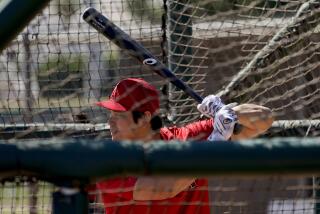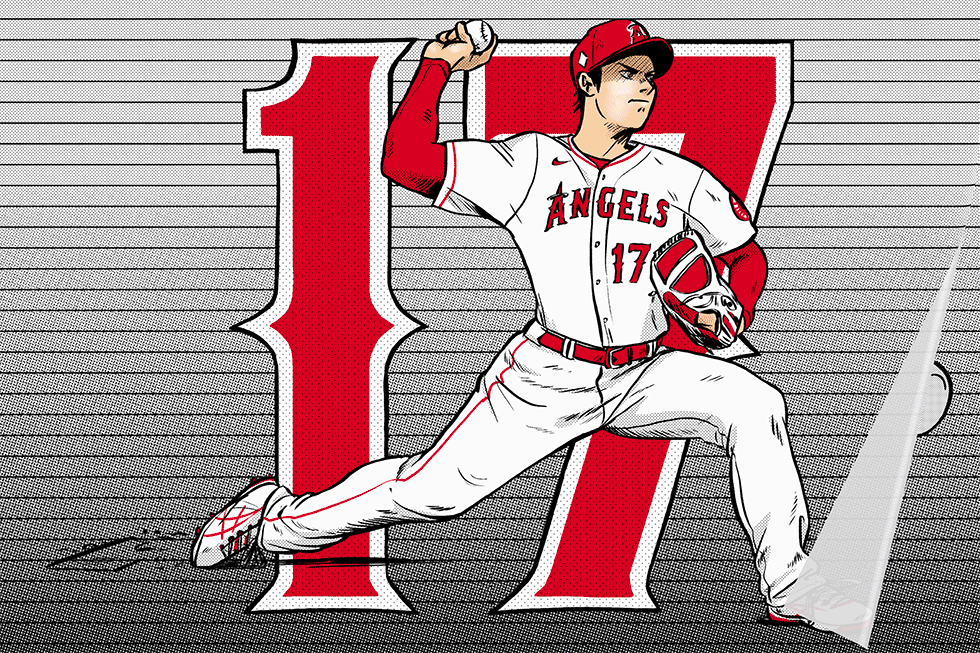Fateful Sophomore Season to Unfold for Wally Joyner : Jinx Unlikely to Bedevil the First Baseman
- Share via
Real or mythical, the sophomore jinx is not a favorite subject among soon-to-be-second-year players. Most simply dismiss the theory with a glare and a few vehement words.
Take Oakland’s Jose Canseco, the 1986 Rookie of the Year, for instance:
“I don’t believe in pressure and I don’t believe in a jinx,” he said. end of interview.
Or, how about Sand Francisco’s Will Clark, who hit .287 with 11 homers in limited action last season:
“The sophomore jinx? I don’t believe in that crap.”
Wally Joyner, the Angels’ squeaky-clean, apple-cheeked first baseman who hit 22 homers and drove in 100 runs last season to finish second in rookie of the year balloting, is more apt to sound like Mr. Rogers than Mr. T.
But that doesn’t mean he thinks differently.
“The sophomore jinx is something one of you (reporters) made up when you didn’t have anything else to write,” he said, smiling politely.
It’s not surprising these young men would rather not ponder the possibility of such an occurence. But statistics show that Rookies of the Year experience an average drop in performance of about 8% in their second year. Of course, players who win that honor usually have pretty good numbers--Canseco hit 33 home runs and drove in 117 runs last season-- and baseball is a statistical roller-coaster for most who play it.
There are a number of theories to explain the sophomore jinx, and there are a lot of American League managers who wouldn’t mind seeing Joyner slump in 1987...particularly in head-to-head competition with their teams.
Still, most general managers, scouts and managers seem to think Joyner is an unlikely candidate.
The ‘It Took a Year to Figure Him Out’ Theory
this is the idea that a rookie has an innate advantage because most major league pitchers haven’t faced him enough to figure out which of their pitches are most effective against him. The rookie has great success for a while, but his numbers start to tail off when his weaknesses are discovered.
One could argue that this might have been the case with Joyner, who had 20 home runs and 72 RBIs at the All-Star break last year and finished the season with 22 homers and 100 RBIs. Most experts attribute the disparity to Joyner’s spectacular six-week surge in the first half, though. Nobody, they say, expected him to hit 40 homers and drive in almost 150 runs.
“I think the sophomore jinx is just a matter of a player who has holes and it took a while for people to discover them,” Oakland Manager Tony LaRussa said. “I don’t think Wally Joyner has any holes, though.
“His emotional makeup was obviously a big plus for him last year. He was a very poised rookie. But, this year and from here on out, it’s more a case of talent and whether you’re vulnerable, and I think Wally is a very solid, all-round player.”
The ‘Boy, This Is Easy’ Theory
This is the one about the kid who sets the big leagues on fire and then forgets about all the work it took to get there. It might be a pitfall for some, but Joyner? The hard-working, even-tempered father of two who has both feet planted firmly in the dirt around first base?
Nah.
“To me, the sophomore jinx is a matter of a second-year player who doesn’t apply himself like he did the year before,” Cleveland Manager Pat Corrales said. “I don’t think it’ll happen to Wally Joyner, though. His head seems to be screwed on right and he has too good of a stroke.
“And you can tell he really works on his defense, too. He’s one of the better-looking rookies with the glove I’ve seen. He doesn’t just get it done with the bat. He’s just a good-looking baseball player, period.”
Joe Torre, the former manager of the Mets and Braves who is an analyst for Angel television broadcasts, says he’s seen rookies who decided they had it all figured out a little prematurely.
“Some rookies have a good year and think, ‘Hey, this isn’t so tough,”’ Torre said. “But the day you stop working on your game...if it’s tennis, golf or whatever, it’s going to jump up and bite you.
“I can’&t; see that happening to Wally, though. He takes this all very seriously.”
The ‘Media Takes a Toll’ Theory
This one lays the blame for poor sophomore seasons on the demands of the press. The media tries to hog every minute of the budding superstar’s time, breaking his concentration and ruining his work habits.
“First off, I don’t believe in jinxes,” said Bob Lemon a Yankees’ scout. “And, in this case, we’re talking about a kid with a lot of talent. He’s loose. He’s down to earth. He’s like a journeyman player.
“His second half wasn’t as good as his first half last year, but a lot of pressure was put on him after that start. He was interviewed all day, every day. He handled it pretty well, but I think it’s got to be a small factor, anyway.$
The media can be a real problem for some players.
“It can be a distraction if you let it,” Torre said. “Don Mattingly is better at overcoming it than any player I’ve ever seen. He’s arguably the best player in the game now, but he gets his work done every single day. With all the distractions he faces every day in New York, all the writers and TV cameras he has to get by to get out on the field, he always gets all his work done first...before he does anything else.
“(Braves outfielder Dale) Murphy had more trouble. He was too nice of a guy. He’d never say, ‘No.’ Finally, I had to forbid the writers from hanging around the batting cage in the spring so he could get some work done.
“Wally had fun last year. The ballclub won and he was able to enjoy all the accolades. But he didn’t seem to let it get in the way of his performance. I don’t think he’ll have any trouble concentrating on what got him where he is.”
It’s difficult to find anyone who sees a slump in Joyner’s future. Everyone admires his stroke, his work habits and his emotional stability. for a player with just one year of bit-league experience, he’s remarkably well-rounded, they say.
And that, according to Texas Manager Bobby Valentine, may be the only thing keeping him from improving as much as some of the other rookies in the Class of ’86.
“I think Wally Joyner is the guy who has probably worked the hardest to get where he is so far,” Valentine told The Sporting News. “He has polished his ability more than the others. He has become an outstanding defensive player and a bit more accomplished hitter than the others.
“Now, he must strive to maintain the level he is at while the others have more chance of improving. statistically, he could get better, but he’s a pretty complete player right now.”
Seattle Manager Dick Williams would like to put some historical perspective on the subject.
“Sophomore jinx?” he asks, sounding skeptical. “Look, some guys have outstanding second years and some don’t. It certainly didn’t bother Mattingly or (Wade) Boggs, or (Johnny) Bench or (Carl) Yastrzemski. If a guy has a great first year and you use that as a starting point, by the third year, he’d have to hit 65 homers and drive in 300 runs.
“Look at Fred Lynn. He was Rookie of the Year and MVP (in 1975 when he hit .331 with 21 home runs and 105 RBI). then, look at his second year (.314 batting average with 10 homers and 65 RBIs). Is that a sophomore jinx?”
And what does he see in Joyner’s future?
“From what I’ve seen, he’s a first-class ballplayer. I just think he’s going to get better and better.”
More to Read
Go beyond the scoreboard
Get the latest on L.A.'s teams in the daily Sports Report newsletter.
You may occasionally receive promotional content from the Los Angeles Times.





